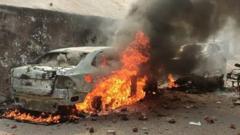In northern India’s Sambhal city, tension surged after violent clashes erupted during a survey of the historic Jama Masjid mosque, resulting in three deaths and numerous injuries. The unrest followed a local court’s order for the survey, sparked by an allegation that the mosque was built on the ruins of a Hindu temple razed in the 1520s by Mughal ruler Babur.
As protests unfolded, demonstrators reportedly set vehicles ablaze and hurled stones at police. In response, authorities have detained 21 individuals and suspended internet services, along with closing schools for a day. Videos and images posted online depicted a chaotic scene, littered with debris, as protesters alleged the police fired upon them, a claim the police refuted.
Authorities claim they used non-lethal methods to control the crowd, with police officer Krishan Kumar asserting that "no weapons were used that could take anyone's life." The current conflict over the Jama Masjid reflects a broader trend of disputes related to religious sites in India, where Hindu groups assert that past rulers demolished temples to erect mosques.
The survey’s timing has drawn scrutiny, especially from local Muslim groups who protested, feeling blindsided by the court's quick decision. As tensions escalated, a police official confirmed the use of tear gas and plastic bullets to disperse crowds as confrontations intensified near the mosque.
The deceased have been identified as Naeem, Bilal, and Nauman, with the police affirming their injuries were caused during the clashes. Opposition figures have accused the ruling Bharatiya Janata Party (BJP) of using the event for political leverage, allegations the party staunchly denies.
Uttar Pradesh’s Deputy Chief Minister assured investigations into the violence, reinforcing that "no one is allowed to take law into their own hands." Mahmood Madani, head of Jamiat Ulama-i-Hind, condemned these ongoing religious disputes as violations of Indian law.
As protests unfolded, demonstrators reportedly set vehicles ablaze and hurled stones at police. In response, authorities have detained 21 individuals and suspended internet services, along with closing schools for a day. Videos and images posted online depicted a chaotic scene, littered with debris, as protesters alleged the police fired upon them, a claim the police refuted.
Authorities claim they used non-lethal methods to control the crowd, with police officer Krishan Kumar asserting that "no weapons were used that could take anyone's life." The current conflict over the Jama Masjid reflects a broader trend of disputes related to religious sites in India, where Hindu groups assert that past rulers demolished temples to erect mosques.
The survey’s timing has drawn scrutiny, especially from local Muslim groups who protested, feeling blindsided by the court's quick decision. As tensions escalated, a police official confirmed the use of tear gas and plastic bullets to disperse crowds as confrontations intensified near the mosque.
The deceased have been identified as Naeem, Bilal, and Nauman, with the police affirming their injuries were caused during the clashes. Opposition figures have accused the ruling Bharatiya Janata Party (BJP) of using the event for political leverage, allegations the party staunchly denies.
Uttar Pradesh’s Deputy Chief Minister assured investigations into the violence, reinforcing that "no one is allowed to take law into their own hands." Mahmood Madani, head of Jamiat Ulama-i-Hind, condemned these ongoing religious disputes as violations of Indian law.




















